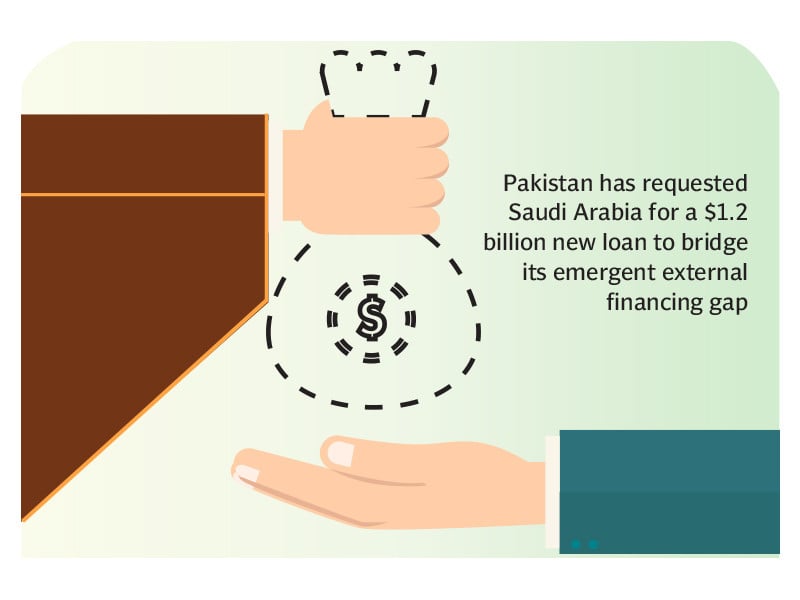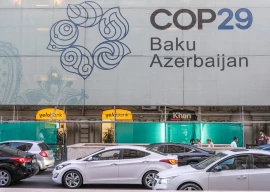
Pakistan has requested a $1.2 billion loan from Saudi Arabia to bridge its emergent external financing gap, as it rushes to arrange loans in order to secure the approval of a $7 billion International Monetary Fund (IMF) bailout programme next month.
Finance Minister Muhammad Aurangzeb discussed the possibility of securing a $1.2 billion annual oil facility with Saudi Finance Minister Mohammad Al-Jadaan a few days ago, according to government officials.
The government was hopeful of receiving a positive response from Al-Jadaan, but no confirmation has been received so far. Officials stated that more than half of the $2 billion financing gap is expected to be filled by Saudi Arabia.
This will be the third consecutive time the Kingdom will provide necessary financing to meet IMF preconditions for board approval. If the Gulf nation agrees to provide another lifeline to Pakistan, its total exposure would increase to $6.2 billion. The Kingdom has already provided $5 billion in cash deposits between 2020 and 2023 to help Pakistan meet IMF conditions for its previous two bailout packages.
The cost of the IMF loan is rising due to overall higher global interest rates and Pakistan's financing requirements exceeding its IMF quota. Pakistan initially signed the 2019 IMF loan facility at a 3.3% interest rate, which later increased to 5.1% under the last Stand-By Arrangement.
In addition to the $1.2 billion requested from Saudi Arabia, Pakistan is also seeking another $800 million from Gulf banks to bridge the financing gap, according to sources. Government officials said they are trying to secure this amount through Saudi Arabia's oil facility and commercial loans from the United Arab Emirates.
In the last fiscal year 2023-24, Saudi Arabia provided a $600 million oil facility, but the contract was prematurely terminated in October last year. Under what is known as the Saudi petrol project, the Kingdom provides $100 million worth of oil on deferred payments each month.
Pakistan is required to secure an additional $2 billion in financing and rollovers of $16.5 billion in cash deposits and foreign commercial loans to get its case relisted on the IMF executive board meeting agenda.
Last week, the IMF postponed the approval of Pakistan's $7 billion programme, which was tentatively scheduled for August 30th, after Islamabad failed to secure timely commitments for loan rollovers and new financing arrangements.
The IMF had conditionally circulated Pakistan's case for board approval, but Islamabad could not meet the required conditions. However, Pakistan did impose a record Rs1.8 trillion in new taxes and increased electricity prices by 51% to qualify for the staff-level agreement signed on July 12th.
This week, Finance Minister Aurangzeb held meetings with Dubai Islamic Bank and Mashreq Bank, requesting them to provide loans to Pakistan.
The finance minister now hopes that the IMF may approve the new Extended Fund Facility in September. Despite the delays, Pakistan's foreign exchange reserves currently stand at $9.3 billion, bolstered by significant purchases from the domestic market by the central bank.
Meanwhile, the government has constituted a steering committee for the restructuring of Chinese energy debt. The committee, headed by the finance minister, includes Power Minister Sardar Awais Laghari, Finance Secretary Imdad Ullah Bosal, and Power Secretary Fakhre Alam Irfan.
The committee's mandate is to work on restructuring Chinese energy debt. During his visit to Beijing, the finance minister requested an extension of the Chinese energy debt repayment period and a rollover of cash deposits for three years. However, Chinese authorities inquired about Pakistan's plans after three years.
Pakistan continues to survive by seeking debt rescheduling every year, a strategy that is compounding its financial problems.
The IMF remains reluctant to approve a new bailout package until it receives commitments from the country's three bilateral creditors not to withdraw their combined $16.3 billion worth of financing pipelines until the end of the new programme.
These commitments are crucial for declaring Pakistan's debt sustainable, as the government is unwilling to restructure its domestic and external debt.






1726140338-01730723472-0/Untitled-design-(42)1726140338-01730723472-0-270x192.webp)
1730702478-0/Copy-of-Untitled-(1)1730702478-0-270x192.webp)





1730706072-0/Copy-of-Untitled-(2)1730706072-0-270x192.webp)


COMMENTS
Comments are moderated and generally will be posted if they are on-topic and not abusive.
For more information, please see our Comments FAQ